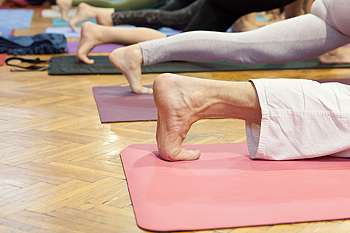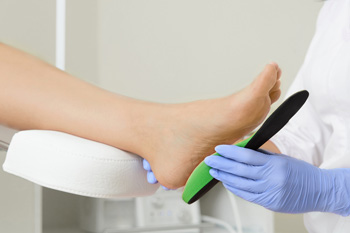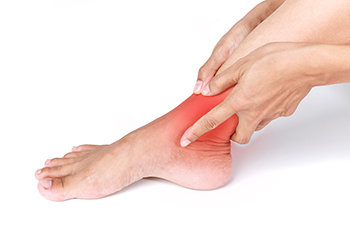Glen Allen Office
(804) 747-3380
 The idea of wearing flip flops is appealing to many people. They are easy to wear and are available in a variety of styles and colors. However, research has indicated that this style of shoe may cause damage to the feet. A person's gait or walking pattern could be negatively impacted in order to accommodate for the lack of arch support and cushioning, and the ankles may turn inward. It can also be easier to stub your toe while wearing flip flops, which may result in a broken toe. Additionally, the toes are constantly gripping the front of the shoe to keep it securely on the foot. This repeated action may cause strain in the overall foot, or cramps may develop as well. There are several other foot conditions that can result from wearing flip flops as well. If you are interested in learning more about the effects flip flops can have on the feet, please speak with a podiatrist.
The idea of wearing flip flops is appealing to many people. They are easy to wear and are available in a variety of styles and colors. However, research has indicated that this style of shoe may cause damage to the feet. A person's gait or walking pattern could be negatively impacted in order to accommodate for the lack of arch support and cushioning, and the ankles may turn inward. It can also be easier to stub your toe while wearing flip flops, which may result in a broken toe. Additionally, the toes are constantly gripping the front of the shoe to keep it securely on the foot. This repeated action may cause strain in the overall foot, or cramps may develop as well. There are several other foot conditions that can result from wearing flip flops as well. If you are interested in learning more about the effects flip flops can have on the feet, please speak with a podiatrist.
Flip-flops are not always the best choice of footwear. If you have any concerns about your feet or ankles, contact one of our podiatrists from The Podiatry Center. Our doctors will assist you with all of your foot and ankle needs.
Flip-Flops and Feet
When the weather starts warming up, people enjoy wearing flip-flops. Flip-flops are comfortable, stylish, and easy to slip on and off; they're perfect for any summer beach goer. However, these shoes can cause harm to the feet.
How Can Flip-Flops Affect Me Long-Term?
Are There Injuries Associated with Flip-Flops?
Yes. Since flip-flops are relatively weak and do not provide the same amount of support as sneakers, people who wear flip-flops regularly are more susceptible to injuries. On top of that, the open nature of the shoe makes your feet more prone to other problems, such as cuts and even infections. Common injuries and ailments include:
I like Wearing Flip-Flops. Are There Safe Alternatives?
When buying flip-flops, try to find ones that have sturdy soles and that are made of high-quality materials that will support for your feet. These flip-flops will cost more but will also last longer as a result.
If you have any questions please feel free to contact one of our offices located in Richmond and Glen Allen, VA . We offer the newest diagnostic and treatment technologies for all your foot and ankle needs.
Fungal toenail infections are a common occurrence, particularly in people over the age of 70. This type of infection, medically referred to as onychomycosis, can embed itself within the multiple layers that make toenails as well as their underlying nail beds. This is one of the reasons why killing the fungus that causes the infection can be so difficult. Another reason is that the fungal organism is highly contagious and can live for months in the warm, moist environments it thrives in (locker rooms, communal showers, bathrooms, enclosed shoes, swimming areas, etc.). It can be transmitted easily onto bare feet, or by wearing wet socks or shoes, and from direct contact with someone who is infected. Nails that are infected by a fungal organism can become thickened, brittle, crumbly, discolored, deformed, and even painful. Depending on the severity of the infection, a podiatrist can use various methods of treatment to eradicate the fungus, prevent it from returning, and help the natural nail to regrow.
For more information about treatment, contact one of our podiatrists of The Podiatry Center. Our doctors can provide the care you need to keep you pain-free and on your feet.
Toenail Fungus Treatment
Toenail fungus is a condition that affects many people and can be especially hard to get rid of. Fortunately, there are several methods to go about treating and avoiding it.
Antifungals & Deterrence
Oral antifungal medicine has been shown to be effective in many cases. It is important to consult with a podiatrist to determine the proper regiment for you, or potentially explore other options.
Applying foot powder on the feet and shoes helps keep the feet free of moisture and sweat.
Sandals or open toed shoes – Wearing these will allow air movement and help keep feet dry. They also expose your feet to light, which fungus cannot tolerate. Socks with moisture wicking material also help as well.
If you have any questions please feel free to contact one of our offices located in Richmond and Glen Allen, VA . We offer the newest diagnostic tools and technology to treat your foot and ankle needs.
 Many patients have occupations that require standing for most of the day. The heel of the foot is often affected by this, and conditions can develop including plantar fasciitis and heel spurs. When the feet are properly stretched it can positively affect the overall body. The standing lunging calf stretch can help to diminish tension in the body that is caused by standing. This stretch may help to promote circulation in the calf muscles which can affect the Achilles tendon. The heels can be stretched by rolling the foot on a tennis ball. Additionally, standing on a step and slowly lowering the heel until a gentle stretch is felt is another way of successfully stretching the heels. If you would like more information about effective foot stretches, please confer with a podiatrist.
Many patients have occupations that require standing for most of the day. The heel of the foot is often affected by this, and conditions can develop including plantar fasciitis and heel spurs. When the feet are properly stretched it can positively affect the overall body. The standing lunging calf stretch can help to diminish tension in the body that is caused by standing. This stretch may help to promote circulation in the calf muscles which can affect the Achilles tendon. The heels can be stretched by rolling the foot on a tennis ball. Additionally, standing on a step and slowly lowering the heel until a gentle stretch is felt is another way of successfully stretching the heels. If you would like more information about effective foot stretches, please confer with a podiatrist.
Why Stretching Is Important for Your Feet
Stretching the feet is a great way to prevent injuries. If you have any concerns with your feet consult with one of our podiatrists from The Podiatry Center. Our doctors will assess your condition and provide you with quality foot and ankle treatment.
Stretching the Feet
Stretching the muscles in the foot is an important part in any physical activity. Feet that are tight can lead to less flexibility and make you more prone to injury. One of the most common forms of foot pain, plantar fasciitis, can be stretched out to help ease the pain. Stretching can not only ease pain from plantar fasciitis but also prevent it as well. However, it is important to see a podiatrist first to determine if stretching is right for you. Podiatrists can also recommend other ways to stretch your feet. Once you know whether stretching is right for you, here are some excellent stretches you can do.
It is best to go easy when first stretching your foot and work your way up. If your foot starts hurting, stop exercising to ice and rest the foot. It is advised that you then see a podiatrist for help.
If you have any questions, please feel free to contact one of our offices located in Richmond and Glen Allen, VA . We offer the newest diagnostic and treatment technologies for all your foot care needs.
Do your feet feel cold—even when it is not cold outside— or numb? Have you noticed that your feet look white, red, blue, or purple at times? If so, you may have poor circulation in your feet. This condition develops when the blood vessels that deliver a steady supply of oxygen and nutrients to the feet through blood constrict or harden. Other symptoms of poor circulation include a loss of hair on the feet or legs, foot or ankle wounds that have trouble healing, cracked or dry skin, and weak toenails. Poor circulation in the feet may be caused by various underlying conditions. Raynaud’s disease can cause spasms in blood vessels and a decrease in the amount of blood to the toes. Constricting blood vessels can sometimes be attributed to acrocyanosis, which may turn the toes blue and make your skin feel cold and clammy. Many people with diabetes suffer from poor circulation due to elevated blood sugar levels. This is particularly dangerous, as this condition can make it difficult for the diabetic to detect wounds. High blood pressure can lead to arteriosclerosis, which can cause arteries to harden and restrict blood flow. Peripheral artery disease (PAD) is a buildup of plaque in the arteries, which also restricts blood flow. If you are experiencing any of the symptoms described here, it is suggested that you make an appointment as soon as possible with a podiatrist.
Poor circulation is a serious condition and needs immediate medical attention. If you have any concerns with poor circulation in your feet contact one of our podiatrists of The Podiatry Center. Our doctors will treat your foot and ankle needs.
Poor Circulation in the Feet
Poor blood circulation in the feet and legs is can be caused by peripheral artery disease (PAD), which is the result of a buildup of plaque in the arteries.
Plaque buildup or atherosclerosis results from excess calcium and cholesterol in the bloodstream. This can restrict the amount of blood which can flow through the arteries. Poor blood circulation in the feet and legs are sometimes caused by inflammation in the blood vessels, known as vasculitis.
Causes
Lack of oxygen and oxygen from poor blood circulation restricts muscle growth and development. It can also cause:
Those who have diabetes or smoke are at greatest risk for poor circulation, as are those who are over 50. If you have poor circulation in the feet and legs it may be caused by PAD and is important to make changes to your lifestyle in order to reduce risk of getting a heart attack or stroke. Exercise and maintaining a healthy lifestyle will dramatically improve conditions.
As always, see a podiatrist as he or she will assist in finding a regimen that suits you. A podiatrist can also prescribe you any needed medication.
If you have any questions please feel free to contact one of our offices located in Richmond and Glen Allen, VA . We offer the newest diagnostic and treatment technologies for all your foot and ankle needs.
Extracorporeal Shockwave Therapy (ESWT) is an FDA-approved treatment for plantar fasciitis, the most common form of heel pain. ESWT delivers targeted high-energy sound waves to the injured and inflamed plantar fascia tissue. This process breaks up scar tissue and encourages the body to create new tissue cells which, in turn, stimulates healing and reduces pain. Acoustic wave therapy has been used for decades in shockwave lithotripsy—a treatment that breaks up kidney stones. ESWT is safe, non-invasive, and treatments generally take less than half an hour on each foot, with typically 3-5 sessions needed for many patients to begin to feel relief. If you have plantar fasciitis, contact a podiatrist to discuss whether you may be a good candidate for ESWT.
Shockwave therapy is a treatment commonly used to treat various injuries and conditions, particularly plantar fasciitis in the feet. To learn more, consult with one of our podiatrists from The Podiatry Center. Our doctors can provide the care you need to keep you pain-free and on your feet.
Shockwave Therapy
Shockwave therapy is a new treatment option designed to treat bone conditions such as tennis elbow, shoulder pain, and others. Shockwave therapy uses high intensity sound waves that are directed to the affected tissues of the body with pinpoint accuracy. The effects are very beneficial, leading to a production of collagen fibers, eliminating inflammation.
Who Benefits from Shockwave?
Shockwave is recommended for patients suffering from heel pain and associated problems. Heel pain is a common condition which can be caused by obesity, overexertion, and spending a substantial amount of time on hard floors with your feet exposed and unsupported.
Fast and Easy
The therapy is actually a simple process that can leave patients feeling better the very next day. Shockwave therapy is not as dramatic as it sounds. It enables more blood flow to effected areas, addressing the source of the problem and allowing treatment to last for a long time.
Treatment & Recovery Time
Shockwave treatment will enable your feet to recover quickly. This is especially important since surgery is not required. It is cost effective and does not require the use of anesthesia. This treatment is a better option to surgery, since it is proven safe.
If you have any questions, please feel free to contact one of our offices located in Richmond and Glen Allen, VA . We offer the newest diagnostic and treatment technologies for all your foot and ankle needs.
 While at first glance, you may assume that there is no difference between over-the-counter (OTC) insoles and custom orthotics, a closer look reveals several key distinctions. OTC insoles are a “one-size-fits-most,” generic approach to supporting your feet. Custom orthotics are customized, prescription medical devices. Your podiatrist starts by reviewing your medical history, examining your feet and diagnosing your condition. Custom orthotics are then created from molds or 3D images of your actual feet. They are designed to specifically treat your medical condition: from arthritis, flat feet and hammertoes to bunions, high arches, deformities, plantar fasciitis and more. Custom orthotics can also help correct certain gait abnormalities and restore function in your feet and ankles. OTC, or prefabricated insoles, are typically made of rubber, flexible plastic or gel which can often lose integrity quickly. Custom orthotics are constructed with superior materials that are durable, light weight, moldable, and cushioning. If you are suffering from foot or ankle pain, or have difficulty walking, see a podiatrist. They will evaluate and diagnose your condition and discuss if custom orthotics can provide the relief you seek.
While at first glance, you may assume that there is no difference between over-the-counter (OTC) insoles and custom orthotics, a closer look reveals several key distinctions. OTC insoles are a “one-size-fits-most,” generic approach to supporting your feet. Custom orthotics are customized, prescription medical devices. Your podiatrist starts by reviewing your medical history, examining your feet and diagnosing your condition. Custom orthotics are then created from molds or 3D images of your actual feet. They are designed to specifically treat your medical condition: from arthritis, flat feet and hammertoes to bunions, high arches, deformities, plantar fasciitis and more. Custom orthotics can also help correct certain gait abnormalities and restore function in your feet and ankles. OTC, or prefabricated insoles, are typically made of rubber, flexible plastic or gel which can often lose integrity quickly. Custom orthotics are constructed with superior materials that are durable, light weight, moldable, and cushioning. If you are suffering from foot or ankle pain, or have difficulty walking, see a podiatrist. They will evaluate and diagnose your condition and discuss if custom orthotics can provide the relief you seek.
If you are having discomfort in your feet and would like to try orthotics, contact one of our podiatrists from The Podiatry Center. Our doctors can provide the care you need to keep you pain-free and on your feet.
What Are Orthotics?
Orthotics are inserts you can place into your shoes to help with a variety of foot problems such as flat feet or foot pain. Orthotics provide relief and comfort for minor foot and heel pain but can’t correct serious biomechanical problems in your feet.
Over-the-Counter Inserts
Orthotics come in a wide variety of over-the-counter inserts that are used to treat foot pain, heel pain, and minor problems. For example, arch supports can be inserted into your shoes to help correct overarched or flat feet, while gel insoles are often used because they provide comfort and relief from foot and heel pain by alleviating pressure.
Prescription Orthotics
If over-the-counter inserts don’t work for you or if you have a more severe foot concern, it is possible to have your podiatrist prescribe custom orthotics. These high-quality inserts are designed to treat problems such as abnormal motion, plantar fasciitis, and severe forms of heel pain. They can even be used to help patients suffering from diabetes by treating foot ulcers and painful calluses and are usually molded to your feet individually, which allows them to provide full support and comfort.
If you are experiencing minor to severe foot or heel pain, it’s recommended to speak with your podiatrist about the possibilities of using orthotics. A podiatrist can determine which type of orthotic is right for you and allow you to take the first steps towards being pain-free.
If you have any questions please contact one of our offices located in Richmond and Glen Allen, VA . We offer the newest diagnostic and treatment technologies for all your foot and ankle needs.
 Running can be great exercise but must be done with care to prevent injuries that can keep you off your feet. The most common cause of running injuries is overtraining. If you run too many miles, too quickly, and too often, you put an enormous amount of strain on your feet and ankles, significantly increasing your risk of injury. To stop this from happening, remember that slow and steady wins the race. Increase the distance, speed, or frequency of your runs one by one and slowly over time. Another common culprit behind running injuries is wearing the wrong shoes. Look for running shoes that fit properly and offer cushioning and support. If you’re a runner, a podiatrist can help you by treating any existing foot or ankle issues, prescribing orthotics if needed, and educating you about injury prevention.
Running can be great exercise but must be done with care to prevent injuries that can keep you off your feet. The most common cause of running injuries is overtraining. If you run too many miles, too quickly, and too often, you put an enormous amount of strain on your feet and ankles, significantly increasing your risk of injury. To stop this from happening, remember that slow and steady wins the race. Increase the distance, speed, or frequency of your runs one by one and slowly over time. Another common culprit behind running injuries is wearing the wrong shoes. Look for running shoes that fit properly and offer cushioning and support. If you’re a runner, a podiatrist can help you by treating any existing foot or ankle issues, prescribing orthotics if needed, and educating you about injury prevention.
All runners should take extra precaution when trying to avoid injury. If you have any concerns about your feet, contact one of our podiatrists of The Podiatry Center. Our doctors will treat your foot and ankle needs.
How to Prevent Running Injuries
There are a lot of mistakes a runner can make prior to a workout that can induce injury. A lot of athletes tend to overstretch before running, instead of saving those workouts for a post-run routine. Deep lunges and hand-to-toe hamstring pulls should be performed after a workout instead of during a warmup. Another common mistake is jumping into an intense routine before your body is physically prepared for it. You should try to ease your way into long-distance running instead of forcing yourself to rush into it.
More Tips for Preventing Injury
If you have any questions, please feel free to contact one of our offices located in Richmond and Glen Allen, VA . We offer the newest diagnostic and treatment technologies for all your foot care needs.
 A ganglion cyst is a benign, fluid-filled mass that develops near a joint capsule or the thin layer of tissue surrounding a tendon. When ganglion cysts develop in the feet, they can occur in the ankle or top of the foot. Ganglion cysts usually present as a visible lump on the outside of the skin, and can cause a dull ache or pain—especially if the cyst is pressing on a joint or tendon, or is being irritated by footwear. In some cases, a ganglion cyst may be caused by some sort of trauma, however the exact cause of these bothersome growths is not always known. Because ganglion cysts sometimes disappear on their own, your podiatrist may determine that monitoring the cyst for a period of time may be the best initial approach. However, if the pain and discomfort are severe, or you have had the cyst for a while, your podiatrist may suggest other treatments such as modifications to footwear, aspirating the cyst and injecting it with steroids, or even surgery if more conservative treatment options don't provide relief or the cyst returns.
A ganglion cyst is a benign, fluid-filled mass that develops near a joint capsule or the thin layer of tissue surrounding a tendon. When ganglion cysts develop in the feet, they can occur in the ankle or top of the foot. Ganglion cysts usually present as a visible lump on the outside of the skin, and can cause a dull ache or pain—especially if the cyst is pressing on a joint or tendon, or is being irritated by footwear. In some cases, a ganglion cyst may be caused by some sort of trauma, however the exact cause of these bothersome growths is not always known. Because ganglion cysts sometimes disappear on their own, your podiatrist may determine that monitoring the cyst for a period of time may be the best initial approach. However, if the pain and discomfort are severe, or you have had the cyst for a while, your podiatrist may suggest other treatments such as modifications to footwear, aspirating the cyst and injecting it with steroids, or even surgery if more conservative treatment options don't provide relief or the cyst returns.
Ankle pain can be caused by a number of problems and may be potentially serious. If you have ankle pain, consult with one of our podiatrists from The Podiatry Center. Our doctors will assess your condition and provide you with quality foot and ankle treatment.
Ankle pain is any condition that causes pain in the ankle. Due to the fact that the ankle consists of tendons, muscles, bones, and ligaments, ankle pain can come from a number of different conditions.
Causes
The most common causes of ankle pain include:
Symptoms
Symptoms of ankle injury vary based upon the condition. Pain may include general pain and discomfort, swelling, aching, redness, bruising, burning or stabbing sensations, and/or loss of sensation.
Diagnosis
Due to the wide variety of potential causes of ankle pain, podiatrists will utilize a number of different methods to properly diagnose ankle pain. This can include asking for personal and family medical histories and of any recent injuries. Further diagnosis may include sensation tests, a physical examination, and potentially x-rays or other imaging tests.
Treatment
Just as the range of causes varies widely, so do treatments. Some more common treatments are rest, ice packs, keeping pressure off the foot, orthotics and braces, medication for inflammation and pain, and surgery.
If you have any questions, please feel free to contact one of our offices located in Richmond and Glen Allen, VA . We offer the newest diagnostic and treatment technologies for all your foot care needs.